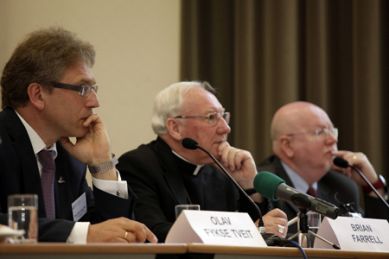Mission is a 'Common Journey' say Leaders

A group of prominent Christian leaders have affirmed that the "common journey" of mission should be considered over divisions among faith traditions.
The concept was shared among representatives from ecumenical, evangelical, and Roman Catholic traditions during a press conference on the topic "Christian unity today" held at the Edinburgh 2010 conference on Saturday.
The Rev. Olav Fykse Tveit, general secretary of the World Council of Churches (WCC), said that it would be a mistake to divide the work of mission, such as assigning one group of churches the task of evangelism and another the task of seeking social justice and peace.
"We should not divide our calling but share our calling – we shouldn't say 'You do this and I do this,' 'You work for mission and we work for unity,' 'You work for justice and we work for evangelism.' There is no such division in the Gospel and there is no such division in Christ," Tveit said.
"[Christians] must respond to our common calling together. The world needs the gospel. The world also has the need for justice and peace," he added.
Tveit noted that for such reasons, the WCC tries to offer "a wide space, a meeting-place for a variety of traditions but also a space for the powerless, for those who have trouble making themselves heard in the world."
"Mission is a commandment, and unity is a prayer," Bishop Brian Farrell of the Pontifical Council for Promoting Christian Unity (PCPCU) affirmed during the conference, adding that the Catholic Church regards the "existing ecumenical movement as a gift of the Holy Spirit."
Farrell added, however, that there are major differences between the groups, and that believers shouldn't expect conferences like Edinburgh 2010 to "solve all the questions on the table."
"But if we are on a journey, we need to stop from time to time, check our progress and our direction, refresh ourselves for the days ahead," he said.
The Rev. Geoff Tunnicliffe, international director of the World Evangelical Alliance (WEA), observed that Christ's prayer for unity in John 17 teaches Christians that "the recognition of Jesus by the world is directly connected to our oneness."
"But diversity can be a strength, if the world sees us together even in our diversity," he said.
"It would be very easy if we were all the same to be one, but the fact that we are diverse, it's in our diversity that the world would see us coming together," he added.
Tunnicliffe also noted that beyond the differences in the faith community "there is an ongoing commitment to finding ways to talk to each other," such as in the joint work done in Geneva in May on a document regarding proselytism.
"It's an ongoing work," he said.
Furthermore, Tveit referred to Edinburgh 2010 and its 1910 predecessor as "stations on our common journey."
"If the outcome of this conference does not strike us as revolutionary, it will be because we have experienced so much already," he said. "We have a deepening recognition that we all are called to proclaim the gospel, and we are learning to do so together."